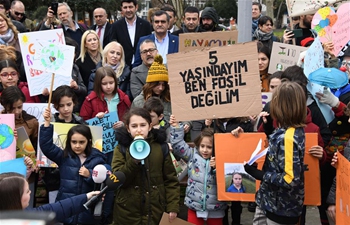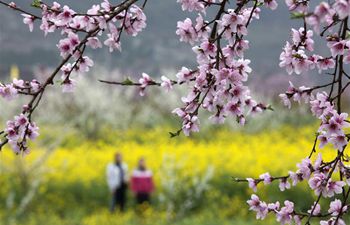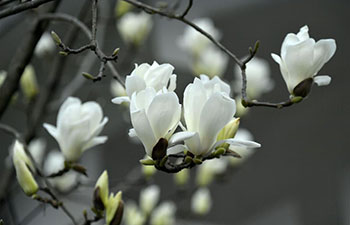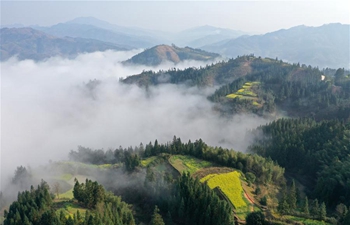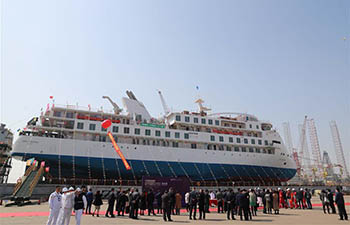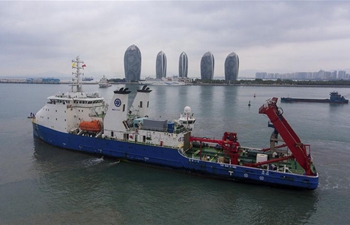
An engineering vehicle is seen on the road connecting the capital Damascus with its Eastern Ghouta countryside, Syria, on March 12, 2019. After eight years of destructive civil war, Syrians in Eastern Ghouta, a former rebel stronghold, are rebuilding their life from ruins. (Xinhua/Hummam Sheikh Ali)
by Hummam Sheikh Ali
DAMASCUS, March 15 (Xinhua) -- After eight years of a destructive civil war, Syrians in Eastern Ghouta, a formerly rebel stronghold east of the capital Damascus, are pulling themselves together to rebuild their lives from ruins.
Ayn Tarma, one of the towns in war-torn Eastern Ghouta, was a scene for fierce battles between the Syrian army and an array of rebel groups, which controlled the region since the beginning of the civil war eight years ago until their defeat last May.
Now, with nearly daily shelling and gunfires fading away, the main marketplace in the town is bustling with life again, though the scars of war are still visible in surrounding buildings dotted with bullet holes and damaged walls.
Not so far from the marketplace, the destruction of war becomes more noticeable in the residential neighborhoods as most of the buildings are either partially or fully destroyed.
In a sign showing the return to normality in the area, some residents were seen fixing their homes, either by their own hands or hiring workers.
Samir Ghabari, a resident of Ayn Tarma, was quick to return to his home in the same month when the government forces entered the area after clearing the rebels from the neighborhood.
Though shocked by the scene of destruction of his house, Ghabari, who escaped to the Jaramana area in Damascus during the war, was determined to rebuild his home instead of succumbing to anger, sadness and discouragement.
Showing Xinhua reporters around his house that is being renovated, Ghabari said the hardest part of his displacement was the high rent of housing he had to pay.
"I have felt so relieved when I returned here because I was returning to my house and belongings. But when I returned, I found that my house was damaged. And we started repairing from the scratch, because we have to return to our normal live," he said.
Ghabari, a state employee, was among the first to leave their homes as the rebels were targeting the state employees.
Samiha Fares, also a state employee, had to leave her home along with her children to seek refuge in Jaramana during the war. She has been rebuilding her house damaged by the war after her return.
"The most important thing was the high rents and the fact that we were displaced from our homes ... When the situation worsened here, we were displaced to an area where we knew no one and we didn't know what to do," Fares told Xinhua.
After returning home, Fares started fixing it with her salary. She said she was relieved that the nightmare of having to pay high rents was finally over.
In another area in Ayn Tarma, Muhammad Shehadeh was among those who didn't leave their area throughout the war.
For him, hunger was the worst experience during that time, who accused the rebels of keeping the stocks of food for themselves while selling food items to people at unaffordable prices.
Now, the situation is different and his wife is a source of inspiration and hope.
Shehadeh's wife, Samira Ayoub, fills the house with roses, mostly plastic, to give hope for a better life. They also stick a small plastic red rose on their door to lend the grayish area a warm welcoming color.
"The situation has become better since the Syrian army entered the area, as everything has become available including electricity and water," Shehadeh told Xinhua.
Ayoub said hope and optimism should prevail despite all difficulties and hardships that her family had gone through.
"The circumstances we have been through should not prevent us from being hopeful, as we should always look back on the past, and life should be full of hope and optimism," she said.
Notably, the Syrian government is working to facilitate the return of normal life to battered Eastern Ghouta, as work is underway to fix one of the main roads connecting the region with Damascus.




